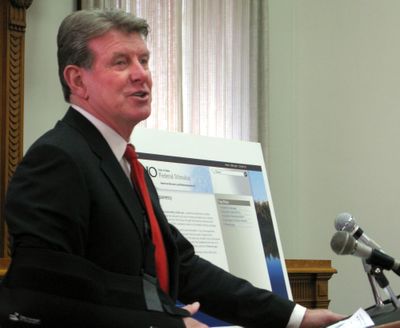Otter plan steers money to roads, not schools

BOISE – Gov. Butch Otter’s plan to boost road spending three different ways but cut education sent Idaho lawmakers reeling Thursday, with some saying the governor’s right and others calling for “middle ground.”
“I applaud the governor in his desire to protect the infrastructure of the state – that’s important. But the infrastructure of the state is not just roads – it’s corrections, it’s state police, it’s education,” said state Senate Finance Chairman Dean Cameron, R-Rupert. “We can’t afford to let that infrastructure slide. We only get a chance once to educate a child in the first grade or to teach ’em to read. If we fail in that infrastructure, it’ll be much more painful … than in roads.”
Otter detailed his plans for spending more than $1.2 billion in federal economic stimulus money Thursday and sent his budget chief, Wayne Hammon, to present the plan to lawmakers.
Sen. Nicole LeFavour, D-Boise, told Hammon, “You want to increase taxes for roads, spend stimulus for roads, borrow for roads and cut education. … I’m truly trying to understand … (why the governor would want) to have education suffer that much.”
Hammon responded, “Nobody likes cutting budgets. The governor believes that fixing our infrastructure is an immediate need, that we must do something.”
Schools are being protected from cuts in the current year, Hammon said; they’ll experience cuts next year like all other state agencies.
In a news conference Thursday, Otter defended his plan, which calls for going beyond the unprecedented $62 million in cuts to public schools next year outlined by state Superintendent Tom Luna, to also trim another $47 million by including schools in a statewide, 5 percent cut in personnel funding.
“You’ve got to remember, 87 percent of school costs are personnel,” the governor said. “It’s just, you’ve got to go where the money is.”
Sen. Joyce Broadsword, R-Sagle, said the governor’s right. “They are a part of the economy. They need to understand that everybody needs to share in that burden,” she said, adding that her local school officials have informed her they’re ready to do their part.
State Rep. George Eskridge, R-Dover, said the governor’s going in “the right direction.” He said, “I’m really concerned about the economy – every morning all I hear is bad news. Education is 50 percent of our budget and I don’t see any way to get out of this without doing that.”
Otter called for the school cuts along with keeping in reserve about half the stimulus money Idaho will receive for schools, plus the state’s $114 million education reserve fund, as a hedge against further economic downturns.
Legislative Democrats objected to the magnitude of education cuts compared to the reserves the state would hold.
House Minority Leader John Rusche, D-Lewiston, offered this analogy: “If you have a sick family member and money in the bank, to say, ‘Well, don’t take care of the sick family member, let’s save the money in case they get sicker’ – that just doesn’t make sense to us.”
Cameron, who chairs the Legislature’s joint budget committee, said, “My preference isn’t to hit education that hard, but the committee will have to decide where it goes.” He predicted, “We’ll find middle ground.”
Otter also flatly rejected a proposal from members of the House GOP leadership to use a big chunk of the economic stimulus money for corporate tax cuts.
“Listen, they’ve got a lot of different ideas over there,” Otter said. “I didn’t see it putting jobs on the street, I didn’t see it putting people to work.” He said if he were in business now and he got a tax break, “I’m gonna put it in my pocket.” That doesn’t create jobs, he said, and the role of the stimulus is to “stimulate the economy right now.”